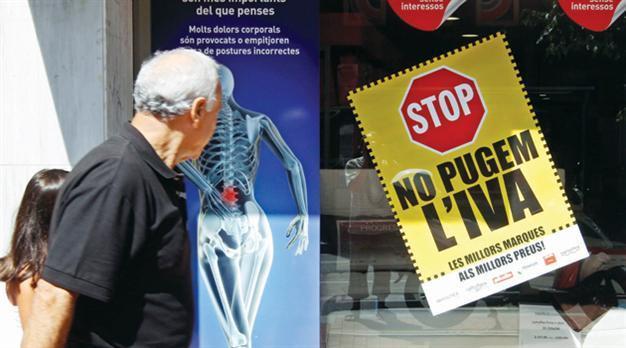Spain done homework, has right to seek bailout, OECD chief says
MADRID - Agence France-Presse

A man looks at a sign outside a store in Mataro in eastern Spain. The country is seeking its way out of a debt crisis, as economists discussing a possible bailout. REUTERS photo
Spain deserves European Union support and has the right to ask for a bailout to unlock required finances over the next two-to-three years, OECD chief Angel Gurria said yesterday. The head of the rich nations’ club spoke as spiraling borrowing costs pushed Spain towards a financing cliff, with about 30 billion euros ($38 billion) in debt repayments due in October alone.The European Central Bank has said it will curb high rates by purchasing stricken eurozone states’ bonds -- but only after they have formally asked for a eurozone bailout with strict conditions. Asked whether Spain would make such a request, Gurria told Spanish public radio RNE: “It is an option, it is a way.” If the eurozone powers agreed that Spain must request financial help before the ECB can act, “then, indeed, we can consider a mechanism in which Spain makes a request for help,” he added.
‘Spain has done most of its homework’ says OECD
“Spain has some requirements for additional resources in the next years while it reduces its deficit,” said the head of the Organization for Economic Cooperation and Development.
If Spain requested help, it would be within its rights, the OECD secretary general said, noting its membership of the eurozone and of the International Monetary Fund.
“It would be doing something that is within its rights, which others have already done, and on the other hand the difference is that Spain has already done most of its homework.” Gurria urged Europe to support Madrid.
“The important thing is that Spain has done practically everything that at a given time would be necessary as conditionality to be deserving of that support,” he said.
“Spain deserves the support of its brothers and sisters in the EU for the stabilization of interest rates so it does not pay seven percent while some other members pay negative rates.” The need to stabilize interest rates was not a Spanish matter alone, Gurria added. “It is a systemic matter.” The OECD secretary general noted that Spain had already secured a eurozone rescue loan of up to 100 billion euros for its banks, flooded with bad loans since a 2008 property market crash.
If, in addition to the banking rescue, Spain decided to ask for a bailout, and the ECB intervened in the bond markets to stabilize borrowing rates, then there would be action “on three levels,” Gurria said. ECB president Mario Draghi said last month that the bank would buy enough bonds on the open market to attack the “financial fragmentation” that has led to such a wide variance in interest rates.
But the central bank would only help governments that had applied formally to the eurozone’s bailout funds and agreed to submit to their strict conditions. Draghi vowed to design the mechanism “over coming weeks,” leading to expectations that the details will be ready for an ECB meeting Thursday, after which he will address the press.
Spain’s Prime Minister Mariano Rajoy has refused to indicate whether he will seek such help. “When I know exactly what is on offer I will take a decision,” he said last week.
Meanwhile, Spain said yesterday it will pump six billion euros ($7.5 billion) “within days” into its bank restructuring fund, which is coming to the rescue of troubled lender Bankia.
The news emerged a day after the state-backed Fund for Orderly Bank Restructuring (FROB) said it would act immediately to inject 4.5 billion euros into money-losing Bankia.
“It will all be done within days,” said a spokeswoman for the economy ministry.
















